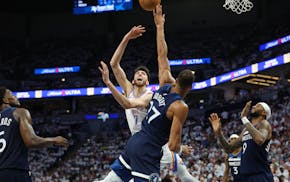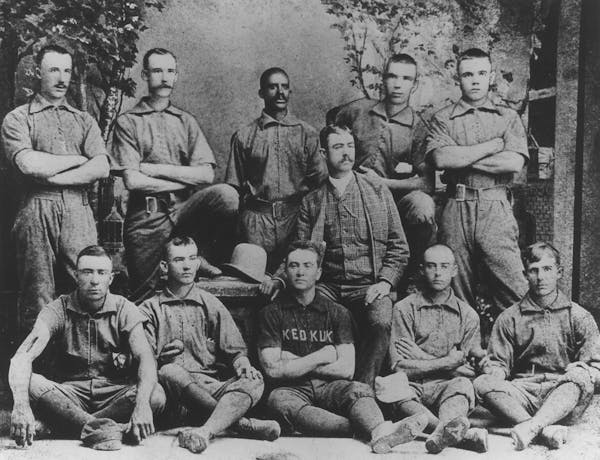He looked overmatched at the plate. Not only could Byron Buxton not hit early in his Major League Baseball career, his flailing swings and strikeout frequency made one wonder if he would ever figure out that part of the game. Today, he's one of the most dangerous hitters in baseball.
Is there a lesson learned in that journey from Point A to Point B, Byron?
Buxton paused a few seconds Saturday morning at his locker stall to consider his answer.
"Stuff's hard," he said, except he used a different word than stuff.
His explanation is more direct, and colorful, than analytics. Hitting is hard, especially for young players, even ones as physically gifted as Buxton.
Buxton's defense in centerfield has always been A-plus, but his hitting those first few seasons were a struggle, to put it kindly. Remember the rationalizations offered up by outside observers at the time? If only Buxton can hit .250 someday, that would be acceptable because his defense makes up for his deficiencies at the plate.
Confession: I never thought we would see this current version of Buxton, the power hitter who smashes the ball with such regularity that it's expected now.
Buxton entered Saturday tied for MLB-lead with nine home runs. He also ranked first in slugging percentage among players with at least 50 at-bats.
The biggest evolution is that when he makes contact, he hits the ball hard.
Early in his career, Buxton's average exit velocity off the bat hovered in the high 80s (miles per hour). His average exit velocity has jumped to 96.4 mph this season, which ranks third in MLB.
His "hard-hit" percentage has improved from the lows 30s to 55.6% this season, which puts him 16th in the league. The ball is jumping off his bat.
Buxton turned philosophical when explaining his development as a hitter.
"Your surroundings, your confidence, just being yourself, plays a big part in how you come to the ballpark and approach the game," he said. "For me it's, don't take one day for granted."
That reminder got reinforced again Saturday when Buxton left a 1-0 win over the Oakland A's in the eighth inning after experiencing right hip tightness. The team plans to evaluate him again Sunday before determining the severity of this latest ailment.
The constant disruption of being injured undoubtedly played a role in stunting Buxton's growth as a hitter over the years. He also needed to clear his head of clutter after listening to endless suggestions from coaches, teammates and probably every person he encountered about how to fix his hitting.
"If you're messing around with mechanics, it's really hard to pick up the ball," former MVP Justin Morneau said. "When you get past that point of thinking about mechanics when you're in the batter's box, you have a lot better chance."
Morneau said young players can create even more problems for themselves by trying to incorporate all the hitting advice they receive.
"You don't want to get a reputation as a guy who is stubborn or not willing to listen," Morneau said. "And when you're struggling, you're always searching for answers. The problem is, when you're struggling there are a lot of people that want to help you, and not everyone is saying the same things. You don't know how to interpret what works for you."
Morneau always believed Buxton would improve as a hitter because his elite athletic skills should translate to that area.
"His hand speed — the fact that he could turn on anyone's fastball — he always had that," Morneau said. "It was just whether he was going to find a swing that worked for him."
That and his willingness to stop swinging at pitches out of the strike zone. Pitchers knew they could get Buxton to chase so they exploited his plate discipline.
"Up here," Morneau said, "if you show a team or show the league that you're going to swing at balls two or three inches off the plate they're just going to keep throwing it there."
Buxton looked so lost as a young hitter that sometimes his at-bats felt hopeless. Morneau offered a simple explanation between then and now.
"Patience," he said.

Scoggins: Buckle up Wolves fans, it's going to be a very telling offseason
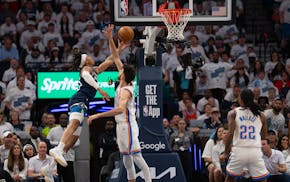
Scoggins: Finch's next challenge is to unleash the Wolves' youngsters
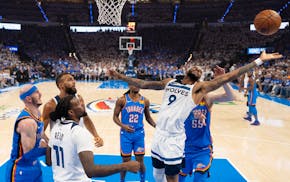
Scoggins: Timberwolves learn just how far behind they are
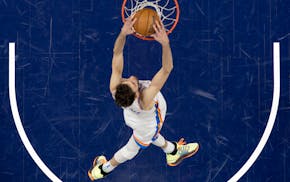
Scoggins: Chet Holmgren is in the right place at the right time
